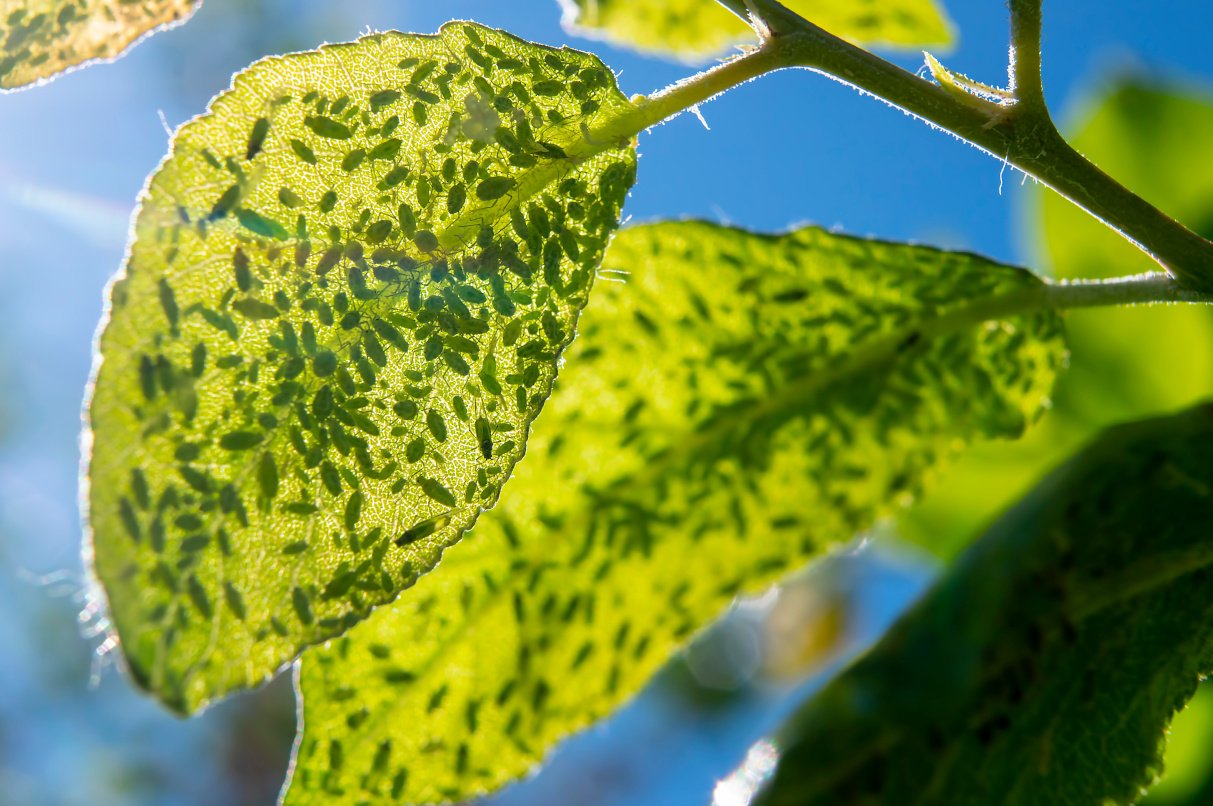Tree Care 101: Watch Out for Spring and Summer Tree Pests
Call a Certified Arborist If You Spot These Signs on Your Kansas City Property
Some tree pests are just annoying, while others wage a path of destruction wherever they go. So, which summer and spring pests do you need to keep an eye out for? Our certified arborists and expert tree surgeons at Arb Tech have the scoop on the 4 worst Midwestern tree pests, and when it’s time to schedule professional tree care in Kansas City.
A Sticky Mess Stirred Up By Aphids
Adult aphids have a soft, pear-shaped body with long legs and antennae. Most aphids are wingless, but they have developed wings during spring and fall when aphid populations are high.
They feed in dense groups on leaves, rarely causing damage to gardens or trees. However, large populations can turn your tree’s leaves yellow, stunt fresh growth, and transfer diseases from tree to tree.
Perhaps one of the worst parts about aphids is the sticky waste they leave behind.
Also known as “honeydew,” because of its stickiness, aphid waste can overtake your outdoor space, and make your vehicles, patios, and driveways a huge, sticky mess.
On the other hand, you’ll feel pretty lucky when you perform tree care for aphids. That’s because their biggest natural predator is the lovely ladybug! It only takes a few ladybugs to significantly cut down the amount of aphids on your trees.
Talk to a tree arborist near you about how you can use the power of ladybugs to control the aphid population in your trees. If your aphid infestation can’t be controlled naturally, your certified arborist may recommend horticultural soap treatments or insecticides.
You’re Seeing Big Damage From Bagworms
It used to be that you would only find these pests in the Eastern United States, but they’ve made their way to the Midwest, and it doesn’t look like they’re going to disappear anytime soon. Bagworms are actually incredibly small, but their 2-inch cocoon, aka their “bags”, are very obvious in your trees.
Even worse, each cocoon has up to 1,000 eggs filled with hungry bagworms ready to munch on your trees. They don’t prefer just one kind of tree, either. Bagworms have been known to make a meal of more than 120 different trees!
These pests can eat up to 80 percent of a tree before it dies. Fortunately, most trees bounce back to life if you get rid of the bagworms in time.
It’s best to call a tree arborist near you to take care of your bagworms, because the best way to get rid of them is by hand. The experts at Arb Tech can help! Not only can we get rid of the bagworms you already have, we can apply a treatment to your tree when bagworm larvae are active until they are no longer feeding on your tree.
Cankerworms Are Causing Problems
A cankerworm, affectionately known as an inchworm, is a caterpillar of a North American Moth. They love to feed on the buds on leaves of Kansas City trees. Normally, they appear in small numbers, but they can show up in large numbers occasionally. When this happens, you’ll see significant tree damage and defoliation.
There are two kinds of cankerworms: fall and spring cankerworms. They have different life cycles, but feed at the same time of year and cause the same amount of damage.
Large and mature trees can stand up to the destruction of cankerworms for a few years, but newly planted and young trees are likely to receive permanent damage from a cankerworm infestation.
If you don’t like the damage they cause to your trees, you definitely won’t like how unsightly they make your landscape. Many people find cankerworms falling into their outdoor meals, in their lawn furniture, and covering their walkways.
The only way to control the cankerworm population in your trees is by scheduling regular inspections by a certified arborist. Routine tree care in Kansas City will maximize the beauty of your trees and increase their lifespan. Plus, you never have to worry about summer pests!
You See Japanese Beetles in Your Garden
These little green and brown beetles have been on the tip of everyone’s tongue in Kansas City for years, because they devastate lawns and gardens. Japanese beetles rarely kill trees and shrubs. However, they severely weaken them, which leaves them susceptible to secondary pests and diseases.
You’ll start noticing a swarm of Japanese beetles emerge from mid-June to the end of August. They like to feed on over 300 plant species and dozens of tree species, like birch, crabapple, Norway maple, and ornamental cherry.
When you have a severe infestation of Japanese beetles, your trees will brown at the top of their canopies and their leaves will drop prematurely. Most experts agree it’s best to contact a specialist in Kansas City tree care in the early spring, to control the Japanese beetle population in your trees during the summer.
Let the Kansas City Tree Care Experts at Arb Tech Kick Your Tree Problems to the Curb
Don’t take tree care into your own hands this summer. Instead, turn to the certified arborists and tree surgeons at Arb Tech! It doesn’t matter what time of year it is or what problem your trees are facing, we’re here to help heal your tree.
From aphids to drought-stress, the professionals at Arb Tech have your trees covered. To schedule a tree care service or ask us a question about the health of your tree, call us at (913) 954-7004 or book an appointment online.
Don’t forget to ask us about our tree removal and commercial tree pruning services, too!

